- Home
- Robert Hugh Benson
By What Authority? Page 4
By What Authority? Read online
Page 4
CHAPTER III
LONDON TOWN
Isabel's visit to London, which had been arranged to take place theChristmas after Anthony's departure to Cambridge, was full of bewilderingexperiences to her. Mr. Norris from time to time had references to lookup in London, and divines to consult as to difficult points in his bookon the Eucharist; and this was a favourable opportunity to see Mr.Dering, the St. Paul's lecturer; so the two took the opportunity, andwith a couple of servants drove up to the City one day early in Decemberto the house of Alderman Marrett, the wool merchant, and a friend of Mr.Norris' father; and for several days both before and after Anthony'sarrival from Cambridge went every afternoon to see the sights. The mazeof narrow streets of high black and white houses with their iron-worksigns, leaning forward as if to whisper to one another, leaving strips ofsky overhead; the strange play of lights and shades after nightfall; thefantastic groups; the incessant roar and rumble of the crowdedalleys--all the commonplace life of London was like an enchanted pictureto her, opening a glimpse into an existence of which she had knownnothing.
To live, too, in the whirl of news that poured in day after day borne bysplashed riders and panting horses;--this was very different to the slowround of country life, with rumours and tales floating in, mellowed bydoubt and lapse of time, like pensive echoes from another world. Forexample, morning by morning, as she came downstairs to dinner, there wasthe ruddy-faced Alderman with his fresh budget of news of thenorth;--Lords Northumberland and Westmoreland with a Catholic force ofseveral thousands, among which were two cousins of Mrs. Marrettherself--and the old lady nodded her head dolorously incorroboration--had marched southwards under the Banner of the FiveWounds, and tramped through Durham City welcomed by hundreds of thecitizens; the Cathedral had been entered, old Richard Norton with thebanner leading; the new Communion table had been cast out of doors, theEnglish Bible and Prayer-book torn to shreds, the old altar reverentlycarried in from the rubbish heap, the tapers rekindled, and amidhysterical enthusiasm Mass had been said once more in the old sanctuary.
Then they had moved south; Lord Sussex was powerless in York; the Queen,terrified and irresolute, alternately storming and crying; Spain wasabout to send ships to Hartlepool to help the rebels; Mary Stuart wouldcertainly be rescued from her prison at Tutbury. Then Mary had been movedto Coventry; then came a last flare of frightening tales: York hadfallen; Mary had escaped; Elizabeth was preparing to flee.
And then one morning the Alderman's face was brighter: it was all a lie,he said. The revolt had crumbled away; my Lord Sussex was impregnablyfortified in York with guns from Hull; Lord Pembroke was gathering forcesat Windsor; Lords Clinton, Hereford and Warwick were converging towardsYork to relieve the siege. And as if to show Isabel it was not a mereromance, she could see the actual train-bands go by up Cheapside with thegleam of steel caps and pike-heads, and the mighty tramp of disciplinedfeet, and the welcoming roar of the swarming crowds.
Then as men's hearts grew lighter the tale of chastisement began to betold, and was not finished till long after Isabel was home again. Greenafter green of the windy northern villages was made hideous by thehanging bodies of the natives, and children hid their faces and ran bylest they should see what her Grace had done to their father.
In spite of the Holy Sacrifice, and the piteous banner, and the call tofight for the faith, the Catholics had hung back and hesitated, and thecatastrophe was complete.
The religion of London, too, was a revelation to this country girl. Shewent one Sunday to St. Paul's Cathedral, pausing with her father beforethey went in to see the new restorations and the truncated steeple struckby lightning eight years before, which in spite of the Queen's angryurging the citizens had never been able to replace.
There was a good congregation at the early morning prayer; and the organsand the singing were to Isabel as the harps and choirs of heaven. Thecanticles were sung to Shephard's setting by the men and children of St.Paul's all in surplices: and the dignitaries wore besides their grey furalmuces, which had not yet been abolished. The grace and dignity of thewhole service, though to older people who remembered the unreformedworship a bare and miserable affair, and to Mr. Norris, with his sinceresimplicity and spirituality, a somewhat elaborate and sensuous mode ofhonouring God, yet to Isabel was a first glimpse of what the mystery ofworship meant. The dim towering arches, through which the dustyrichly-stained sunbeams poured, the far-away murmurous melodies thatfloated down from the glimmering choir, the high thin pealing organ, allcombined to give her a sense of the unfathomable depths of the DivineMajesty--an element that was lacking in the clear-cut personal Puritancreed, in spite of the tender associations that made it fragrant for her,and the love of the Saviour that enlightened and warmed it. The sight ofthe crowds outside, too, in the frosty sunlight, gathered round the greystone pulpit on the north-east of the Cathedral, and streaming down everyalley and lane, the packed galleries, the gesticulating black figure ofthe preacher--this impressed on her an idea of the power of corporatereligion, that hours at her own prayer-desk, or solitary twilight walksunder the Hall pines, or the uneventful divisions of the Rector's villagesermons, had failed to give.
It was this Sunday in London that awakened her quiet soul from the lonelycompanionship of God, to the knowledge of that vast spiritual world ofmen of which she was but one tiny cell. Her father observed her quietlyand interestedly as they went home together, but said nothing beyond anindifferent word or two. He was beginning to realise the serious realityof her spiritual life, and to dread anything that would even approximateto coming between her soul and her Saviour. The father and daughterunderstood one another, and were content to be silent together.
Her talks with Mrs. Marrett, too, left their traces on her mind. TheAlderman's wife, for the first time in her life, found her views andreminiscences listened to as if they were oracles, and she needed littleencouragement to pour them out in profusion. She was especially generouswith her tales of portents and warnings; and the girl was more than onceconsiderably alarmed by what she heard while the ladies were alone in thedim firelit parlour on the winter afternoons before the candles werebrought in.
"When you were a little child, my dear," began the old lady one day,"there was a great burning made everywhere of all the popish images andvestments; all but the copes and the altar-cloths that they made intodresses for the ministers' new wives, and bed-quilts to cover them; andthere were books and banners and sepulchres and even relics. I went outto see the burning at Paul's, and though I knew it was proper that theold papistry should go, yet I was uneasy at the way it was done.
"Well," went on the old lady, glancing about her, "I was sitting in thisvery room only a few days after, and the air began to grow dark andheavy, and all became still. There had been two or three cocks crowingand answering one another down by the river, and others at a distance;and they all ceased: and there had been birds chirping in the roof, andthey ceased. And it grew so dark that I laid down my needle and went tothe window, and there at the end of the street over the houses there wascoming a great cloud, with wings like a hawk, I thought; but some saidafterwards that, when they saw it, it had fingers like a man's hand, andothers said it was like a great tower, with battlements. However that maybe, it grew nearer and larger, and it was blue and dark like that curtainthere; and there was no wind to stir it, for the windows had ceasedrattling, and the dust was quiet in the streets; and still it came onquickly, growing as it came; and then there came a far-away sound, like aheavy waggon, or, some said, like a deep voice complaining. And I turnedaway from the window afraid; and there was the cat, that had been on achair, down in the corner, with her back up, staring at the cloud: andthen she began to run round the room like a mad thing, and presentlywhisked out of the door when I opened it. And I went to find Mr. Marrett,and he had not come in, and all the yard was quiet. I could only hear ahorse stamp once or twice in the stable. And then as I saw calling outfor some one to come, the s
torm broke, and the sky was all one dark cloudfrom side to side. For three hours it went on, rolling and clapping, andthe lightning came in through the window that I had darkened and throughthe clothes over my head; for I had gone to my bed and rolled myselfround under the clothes. And so it went on--and, my dear--" and Mrs.Marrett put her head close to Isabel's--"I prayed to our Lady and thesaints, which I had not done since I was married; and asked them to prayGod to keep me safe. And then at the end came a clap of thunder and aflash of lightning more fearful than all that had gone before; and atthat very moment, so Mr. Marrett told me when he came in, two of thedoors in St. Denys' Church in Fanshawe Street were broken in pieces bysomething that crushed them in, and the stone steeple of Allhallow Churchin Bread Street was broken off short, and a part of it killed a dog thatwas beneath, and overthrew a man that played with the dog."
Isabel could hardly restrain a shiver and a glance round the dark oldroom, so awful were Mrs. Marrett's face and gestures and loud whisperingtone, as she told this.
"Ah! but, my dear," she went on, "there was worse happened to poor KingHal, God rest him--him who began to reform the Church, as they say, anddestroyed the monasteries. All the money that he left for masses for hissoul was carried off with the rest at the change of religion; and thatwas bad enough, but this is worse. This is a tale, my dear, that I haveheard my father tell many a time; and I was a young woman myself when ithappened. The King's Grace was threatened by a friar, I think ofGreenwich, that if he laid hands on the monasteries he should be as Ahabwhose blood was licked by dogs in the very place which he took from aman. Well, the friar was hanged for his pains, and the King lived. Andthen at last he died, and was put in a great coffin, and carried throughLondon; and they put the coffin in an open space in Sion Abbey, which theKing had taken. And in the night there came one to view the coffin, andto see that all was well. And he came round the corner, and there stoodthe great coffin--(for his Grace was a great stout man, my dear)--ontrestles in the moonlight, and beneath it a great black dog that lappedsomething: and the dog turned as the man came, and some say, but not myfather, that the dog's eyes were red as coals, and that his mouth andnostrils smoked, and that he cast no shadow; but (however that may be)the dog turned and looked and then ran; and the man followed him into ayard, but when he reached there, there was no dog. And the man went backto the coffin afraid; and he found the coffin was burst open, and--and--"
Mrs. Marrett stopped abruptly. Isabel was white and trembling.
"There, there, my dear. I am a foolish old woman; and I'll tell you nomore."
Isabel was really terrified, and entreated Mrs. Marrett to tell hersomething pleasant to make her forget these horrors; and so she told herold tales of her youth, and the sights of the city, and the great doingsin Mary's reign; and so the time passed pleasantly till the gentlemencame home.
At other times she told her of Elizabeth and the great nobles, andIsabel's heart beat high at it, and at the promise that before she leftshe herself should see the Queen, even if she had to go to Greenwich orNonsuch for it.
"God bless her," said Mrs. Marrett loyally, "she's a woman like ourselvesfor all her majesty. And she likes the show and the music too, like usall. I declare when I see them all a-going down the water to Greenwich,or to the Tower for a bear-baiting, with the horns blowing and the gunsfiring and the banners and the barges and the music, I declare sometimesI think that heaven itself can be no better, God forgive me! Ah! but Iwish her Grace 'd take a husband; there are many that want her; and thenwe could laugh at them all. There's so many against her Grace now who'dbe for her if she had a son of her own. There's Duke Charles whosepicture hangs in her bedroom, they say; and Lord Robert Dudley--there's ahandsome spark, my dear, in his gay coat and his feathers and his ruff,and his hand on his hip, and his horse and all. I wish she'd take him andhave done with it. And then we'd hear no more of the nasty Spaniards.There's Don de Silva, for all the world like a monkey with his brown faceand mincing ways and his grand clothes. I declare when Captain Hawkinscame home, just four years ago last Michaelmas, and came up to Londonwith his men, all laughing and rolling along with the people cheeringthem, I could have kissed the man--to think how he had made the brown mendance and curse and show their white teeth! and to think that the Don hadto ask him to dinner, and grin and chatter as if nought had happened."
And Mrs. Marrett's good-humoured face broke into mirth at the thought ofthe Ambassador's impotence and duplicity.
Anthony's arrival in London a few days before Christmas removed the oneobstacle to Isabel's satisfaction--that he was not there to share it withher. The two went about together most of the day under their father'scare, when he was not busy at his book, and saw all that was to be seen.
One afternoon as they were just leaving the courtyard of the Tower, whichthey had been visiting with a special order, a slight reddish-haired man,who came suddenly out of a doorway of the White Tower, stopped a momentirresolutely, and then came towards them, bare-headed and bowing. He hadsloping shoulders and a serious-looking mouth, with a reddish beard andmoustache, and had an air of strangely mingled submissiveness andcapability. His voice too, as he spoke, was at once deferential anddecided.
"I ask your pardon, Mr. Norris," he said. "Perhaps you do not rememberme."
"I have seen you before," said the other, puzzled for a moment.
"Yes, sir," said the man, "down at Great Keynes; I was in service at theHall, sir."
"Yes, yes," said Mr. Norris, "I remember you perfectly. Lackington, is itnot?"
The man bowed again.
"I left about eight years ago, sir; and by the blessing of God, havegained a little post under the Government. But I wished to tell you, sir,that I have been happily led to change my religion. I was a Papist, sir,you know."
Mr. Norris congratulated him.
"I thank you, sir," said Lackington.
The two children were looking at him; and he turned to them and bowedagain.
"Mistress Isabel and Master Anthony, sir, is it not?"
"I remember you," said Isabel a little shyly, "at least, I think so."
Lackington bowed again as if gratified; and turned to their father.
"If you are leaving, Mr. Norris, would you allow me to walk with you afew steps? I have much I would like to ask you of my old master andmistress."
The four passed out together; the two children in front; and as they wentLackington asked most eagerly after the household at the Hall, andespecially after Mr. James, for whom he seemed to have a specialaffection.
"It is rumoured," said Mr. Norris, "that he is going abroad."
"Indeed, sir," said the servant, with a look of great interest, "I hadheard it too, sir; but did not know whether to believe it."
Lackington also gave many messages of affection to others of thehousehold, to Piers the bailiff, and a couple of the foresters: andfinished by entreating Mr. Norris to use him as he would, telling him howanxious he was to be of service to his friends, and asking to beentrusted with any little errands or commissions in London that thecountry gentleman might wish performed.
"I shall count it, sir, a privilege," said the servant, "and you shallfind me prompt and discreet."
One curious incident took place just as Lackington was taking his leaveat the turning down into Wharf Street; a man hurrying eastwards almostran against them, and seemed on the point of apologising, but his facechanged suddenly, and he spat furiously on the ground, mumblingsomething, and hurried on. Lackington seemed to see nothing.
"Why did he do that?" interrupted Mr. Norris, astonished.
"I ask your pardon, sir?" said Lackington interrogatively.
"That fellow! did you not see him spit at me?"
"I did not observe it, sir," said the servant; and presently took hisleave.
"Why did that man spit at you, father?" asked Isabel, when they had comeindoors.
"I cannot think, my dear; I have never seen him in my life."
"I think Lackington knew," said Anthony, wit
h a shrewd air.
"Lackington! Why, Lackington did not even see him."
"That was just it," said Anthony.
Anthony's talk about Cambridge during these first evenings in London wasfascinating to Isabel, if not to their father, too. It concerned ofcourse himself and his immediate friends, and dealt with such subjects ascock-fighting a good deal; but he spoke also of the public disputationsand the theological champions who crowed and pecked, not unlike cocksthemselves, while the theatre rang with applause and hooting. The sportwas one of the most popular at the universities at this time. But aboveall his tales of the Queen's visit a few years before attracted the girl,for was she not to see the Queen with her own eyes?
"Oh! father," said the lad, "I would I had been there five years agowhen she came. Master Taylor told me of it. They acted the _Aulularia_,you know, in King's Chapel on the Sunday evening. Master Taylor took apart, I forget what; and he told me how she laughed and clapped. Andthen there was a great disputation before her, one day, in St. Mary'sChurch, and the doctors argued, I forget what about, but Master Taylorsays that of course the Genevans had the best of it; and the Queenspoke, too, in Latin, though she did not wish to, but my lord of Elypersuaded her to it; so you see she could not have learned it by heart,as some said. And she said she would give some great gift to theUniversity; but Master Taylor says they are still waiting for it; but itmust come soon, you see, because it is the Queen's Grace who haspromised it; but Master Taylor says he hopes she has forgotten it, buthe laughs when I ask him what he means, and says it again."
"Who is this Master Taylor?" asked his father.
"Oh! he is a Fellow of King's," said Anthony, "and he told me about theProvost too. The Provost is half a Papist, they say: he is very old now,and he has buried all the vessels and the vestments of the Chapel, theysay, somewhere where no one knows; and he hopes the old religion willcome back again some day; and then he will dig them up. But that isPapistry, and no one wants that at Cambridge. And others say that he isa Papist altogether, and has a priest in his house sometimes. But I donot think he can be a Papist, because he was there when the Queen wasthere, bowing and smiling, says Master Taylor; and looking on the Queenso earnestly, as if he worshipped her, says Master Taylor, all the timethe Chancellor was talking to her before they went into the chapel forthe _Te Deum_. But they wished they had kept some of the things, likethe Provost, says Master Taylor, because they were much put to it whenher Grace came down for stuffs to cover the communion-tables and forsurplices, for Cecil said she would be displeased if all was bare andpoor. Is it true, father," asked Anthony, breaking off, "that the Queenlikes popish things, and has a crucifix and tapers on the table in herchapel?"
"Ah! my son," said Mr. Norris, smiling, "you must ask one who knows. Andwhat else happened?"
"Well," said Anthony, "the best is to come. They had plays, you know,the _Dido_, and one called _Ezechias_, before the Queen. Oh! and shesent for one of the boys, they say, and--and kissed him, they say; but Ithink that cannot be true."
"Well, my son, go on!"
"Oh! and some of them thought they would have one more play before shewent; but she had to go a long journey and left Cambridge before theycould do it, and they went after her to--to Audley End, I think, whereshe was to sleep, and a room was made ready, and when all was prepared,though her Grace was tired, she came in to see the play. Master Taylorwas not there; he said he would rather not act in that one; but he hadthe story from one who acted, but no one knew, he said, who wrote theplay. Well, when the Queen's Grace was seated, the actors came on,dressed, father, dressed"--and Anthony's eyes began to shine withamusement--"as the Catholic Bishops in the Tower. There was Bonner in hispopish vestments--some they had from St. Benet's--with a staff and histall mitre, and a lamb in his arms; and he stared at it and gnashed histeeth at it as he tramped in; and then came the others, all like bishops,all in mass-vestments or cloth cut to look like them; and then at the endcame a dog that belonged to one of them, well-trained, with the PopishHost in his mouth, made large and white, so that all could see what itwas. Well, they thought the Queen would laugh as she was a Protestant,but no one laughed; some one said something in the room, and a lady criedout; and then the Queen stood up and scolded the actors, and trouncedthem well with her tongue, she did, and said she was displeased; and thenout she went with all her ladies and gentlemen after her, except one ortwo servants who put out the lights at once without waiting, and brokeBonner's staff, and took away the Host, and kicked the dog, and told themto be off, for the Queen's Grace was angered with them; and so they hadto get back to Cambridge in the dark as well as they might."
"Oh! the poor boys!" said Mrs. Marrett, "and they did it all to pleaseher Grace, too."
"Yes," said the Alderman, "but the Queen thought it enough, I dare say,to put the Bishops in prison, without allowing boys to make a mock ofthem and their faith before her."
"Yes," said Anthony, "I thought that was it."
When the Alderman came in a day or two later with the news that Elizabethwas to come up from Nonsuch the next day, and to pass down Cheapside onher way to Greenwich, the excitement of Isabel and Anthony wasindescribable.
Cheapside was joyous to see, as the two, with their father behind themtalking to a minister whose acquaintance he had made, sat at afirst-floor window soon after mid-day, waiting to see the Queen go by.Many of the people had hung carpets or tapestries, some of taffetas andcloth-of-gold, out of their balconies and windows, and the very signsthemselves,--fantastic ironwork, with here and there a grotesque beastrampant, or a bright painting, or an escutcheon;--with the gay,good-tempered crowds beneath and the strip of frosty blue sky, crossedby streamers from side to side, shining above the towering eaves andgables of the houses, all combined to make a scene so astonishing thatit seemed scarcely real to these country children.
It was yet some time before she was expected; but there came a suddenstir from the upper end of Cheapside, and then a burst of cheering andlaughter and hoots. Anthony leaned out to see what was coming, but couldmake out nothing beyond the head of a horse, and a man driving it fromthe seat of a cart, coming slowly down the centre of the road. Thelaughter and noise grew louder as the crowds swayed this way and that tomake room. Presently it was seen that behind the cart a little space waskept, and Anthony made out the grey head of a man at the tail of thecart, and the face of another a little way behind; then at last, as thecart jolted past, the two children saw a man stripped to the waist, hishands tied before him to the cart, his back one red wound; while ahangman walked behind whirling his thonged whip about his head andbringing it down now and again on the old man's back. At each lash theprisoner shrank away, and turned his piteous face, drawn with pain, fromside to side, while the crowd yelled and laughed.
"What's it for, what's it for?" inquired Anthony, eager and interested.
A boy leaning from the next window answered him.
"He said Jesus Christ was not in heaven."
At that moment a humorist near the cart began to cry out:
"Way for the King's Grace! Way for the King's Grace!" and the crowd tookthe idea instantly: a few men walking with the cart formed lines likegentlemen ushers, uncovering their heads and all crying out the samewords; and one eager player tried to walk backwards until he was trippedup. And so the dismal pageant of this red-robed king of anguish went by;and the hoots and shouts of his heralds died away. Anthony turned toIsabel, exultant and interested.
"Why, Isabel," he said, "you look all white. What is it? You know he's ablasphemer."
"I know, I know," said Isabel.
Then suddenly, far away, came the sound of trumpets, and gusts of distantcheering, like the sound of the wind in thick foliage. Anthony leaned outagain, and an excited murmur broke out once more, as all faces turnedwestwards. A moment more, and Anthony caught a flash of colour from thecorner near St. Paul's Churchyard; then the shrill trumpets soundednearer, and the cheering broke out at the end, and ran down the streetlike a wave of noise.
From every window faces leaned out; even on theroofs and between the high chimney pots were swaying figures.
Masses of colour now began to emerge, with the glitter of steel, roundthe bend of the street, where the winter sunshine fell; and the crowdsbegan to surge back, and against the houses. At first Anthony could makeout little but two moving rippling lines of light, coming parallel,pressing the people back; and it was not until they had come opposite thewindow that he could make out the steel caps and pikeheads of men inhalf-armour, who, marching two and two with a space between them, led theprocession and kept the crowds back. There they went, with immovabledisciplined faces, grounding their pike-butts sharply now and again,caring nothing for the yelp of pain that sometimes followed. Immediatelybehind them came the aldermen in scarlet, on black horses that tossedtheir jingling heads as they walked. Anthony watched the solemn faces ofthe old gentlemen with a good deal of awe, and presently made out hisfriend, Mr. Marrett, who rode near the end, but who was too muchengrossed in the management of his horse to notice the two children whocried out to him and waved. The serjeants-of-arms followed, and then twolines again of gentlemen-pensioners walking, bare-headed, carrying wands,in short cloaks and elaborate ruffs. But the lad saw little of them, forthe splendour of the lords and knights that followed eclipsed themaltogether. The knights came first, in steel armour with raised vizors,the horses too in armour, moving sedately with a splendid clash of steel,and twinkling fiercely in the sunshine; and then, after them (and Anthonydrew his breath swiftly) came a blaze of colour and jewels as the greatlords in their cloaks and feathered caps, metal-clasped and gemmed, cameon their splendid long-maned horses; the crowd yelled and cheered, andgreat names were tossed to and fro, as the owners passed on, each talkingto his fellow as if unconscious of the tumult and even of the presence ofthese shouting thousands. The cry of the trumpets rang out again high andshattering, as the trumpeters and heralds in rich coat-armour came next;and Anthony looked a moment, fascinated by the lions and lilies, and thebrightness of the eloquent horns, before he turned his head to see theLord Mayor himself, mounted on a great stately white horse, that neededno management, while his rider bore on a cushion the sceptre. Ah! she wascoming near now. The two saw nothing of the next rider who carried aloftthe glittering Sword of State, for their eyes were fixed on the sixplumed heads of the horses, with grooms and footmen in cassock-coats andvenetian hose, and the great gilt open carriage behind that swayed andjolted over the cobbles. She was here; she was here; and the loyal crowdsyelled and surged to and fro, and cloths and handkerchiefs flapped andwaved, and caps tossed up and down, as at last the great creakingcarriage came under the window.
This is what they saw in it.
A figure of extraordinary dignity, sitting upright and stiff like a paganidol, dressed in a magnificent and fantastic purple robe, with a greatdouble ruff, like a huge collar, behind her head; a long taper waist,voluminous skirts spread all over the cushions, embroidered with curiousfigures and creatures. Over her shoulders, but opened in front so as toshow the ropes of pearls and the blaze of jewels on the stomacher, was apurple velvet mantle lined with ermine, with pearls sewn into it here andthere. Set far back on her head, over a pile of reddish-yellow hair drawntightly back from the forehead, was a hat with curled brims, elaboratelyembroidered, with the jewelled outline of a little crown in front, and ahigh feather topping all.
And her face--a long oval, pale and transparent in complexion, with asharp chin, and a high forehead; high arched eyebrows, auburn, but alittle darker than her hair; her mouth was small, rising at the corners,with thin curved lips tightly shut; and her eyes, which were clear incolour, looked incessantly about her with great liveliness andgood-humour.
There was something overpowering to these two children who looked, tooawed to cheer, in this formidable figure in the barbaric dress, thegorgeous climax of a gorgeous pageant. Apart from the physical splendour,this solitary glittering creature represented so much--it was theincarnate genius of the laughing, brutal, wanton English nation, that sathere in the gilded carriage and smiled and glanced with tight lips andclear eyes. She was like some emblematic giant, moving in a processionalcar, as fantastic as itself, dominant and serene above the heads of themaddened crowds, on to some mysterious destiny. A sovereign, howeverpersonally inglorious, has such a dignity in some measure; and Elizabethadded to this an exceptional majesty of her own. Henry would not havebeen ashamed for this daughter of his. What wonder then that these crowdswere delirious with love and loyalty and an exultant fear, as thisoverwhelming personality went by:--this pale-faced tranquil virgin Queen,passionate, wanton, outspoken and absolutely fearless; with a sufficientreserve of will to be fickle without weakness; and sufficient grasp ofher aims to be indifferent to her policy; untouched by vital religion;financially shrewd; inordinately vain. And when this strange dominantcreature, royal by character as by birth, as strong as her father and aswanton as her mother, sat in ermine and velvet and pearls in a royalcarriage, with shrewd-faced wits, and bright-eyed lovers, and solemnstatesmen, and great nobles, vacuous and gallant, glittering and jinglingbefore her; and troops of tall ladies in ruff and crimson mantle ridingon white horses behind; and when the fanfares went shattering down thestreet, vibrating through the continuous roar of the crowd and the shrillcries of children and the mellow thunder of church-bells rockingoverhead, and the endless tramp of a thousand feet below; and when thewhole was framed in this fantastic twisted street, blazing withtapestries and arched with gables and banners, all bathed in glory by theclear frosty sunshine--it is little wonder that for a few minutes atleast this country boy felt that here at last was the incarnation of hisdreams; and that his heart should exult, with an enthusiasm he could notinterpret, for the cause of a people who could produce such a queen, andof a queen who could rule such a people; and that his imagination shouldbe fired with a sudden sense that these were causes for which thesacrifice of a life would be counted cheap, if they might thereby befurthered.
Yet, in this very moment, by one of those mysterious suggestions thatrise from the depth of a soul, the image sprang into his mind, and poiseditself there for an instant, of the grey-haired man who had passed halfan hour ago, sobbing and shrinking at the cart's tail.

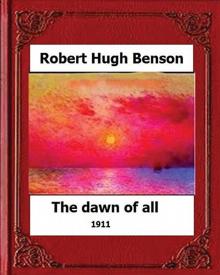 The Dawn of All
The Dawn of All By What Authority?
By What Authority?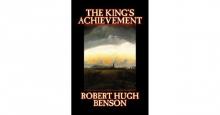 The King's Achievement
The King's Achievement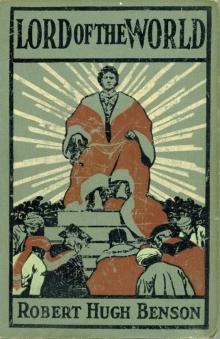 Lord of the World
Lord of the World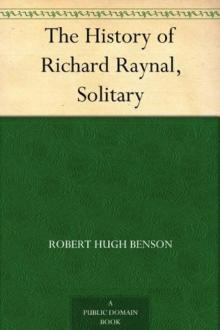 The History of Richard Raynal, Solitary
The History of Richard Raynal, Solitary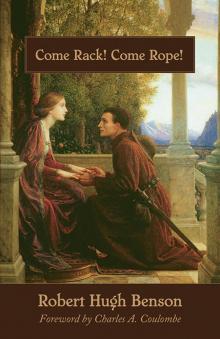 Come Rack, Come Rope
Come Rack, Come Rope